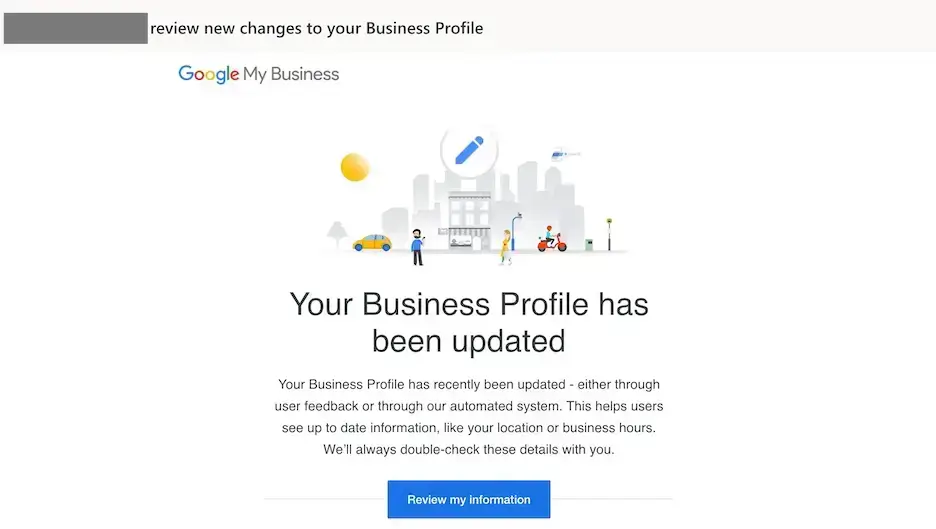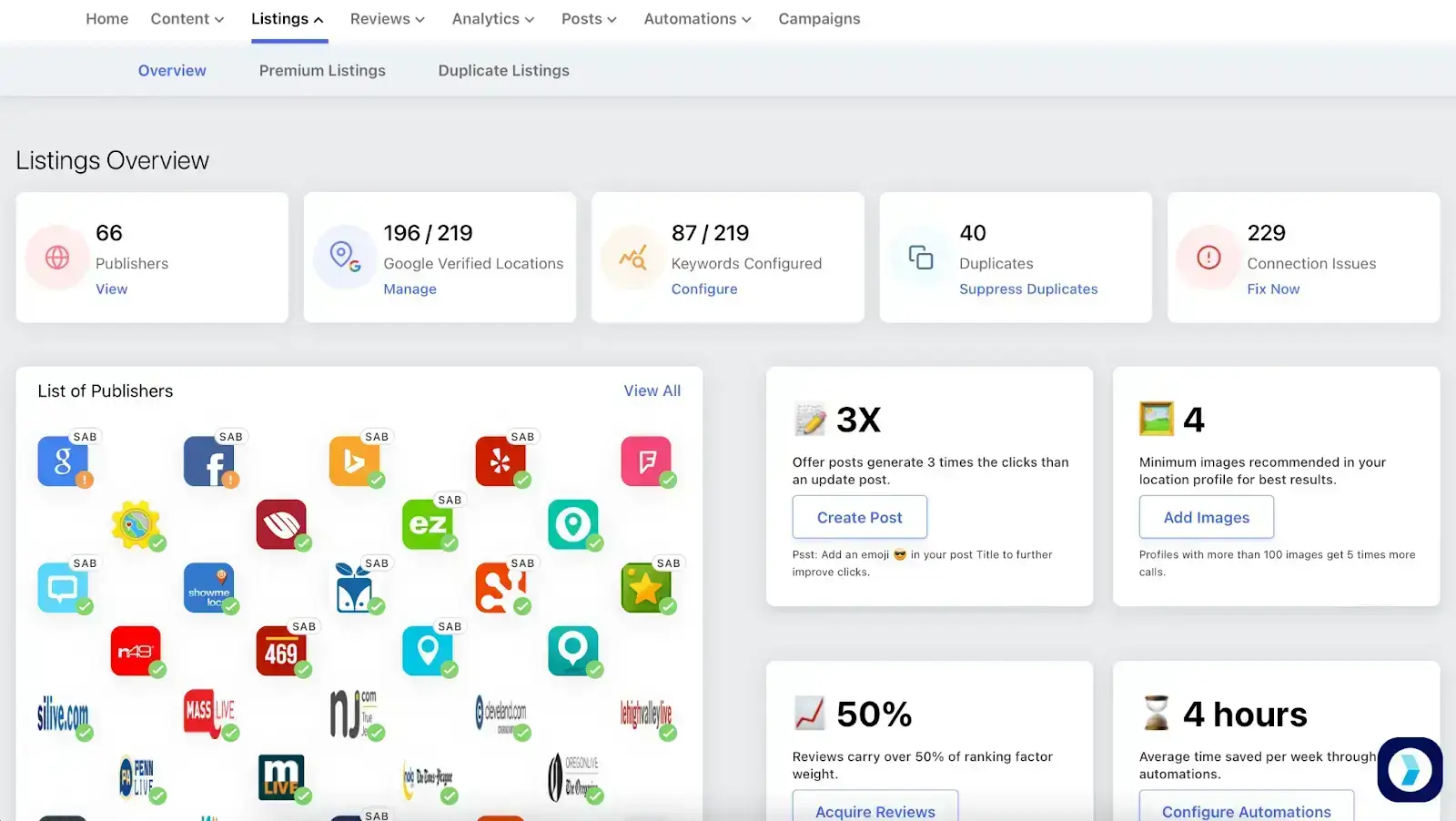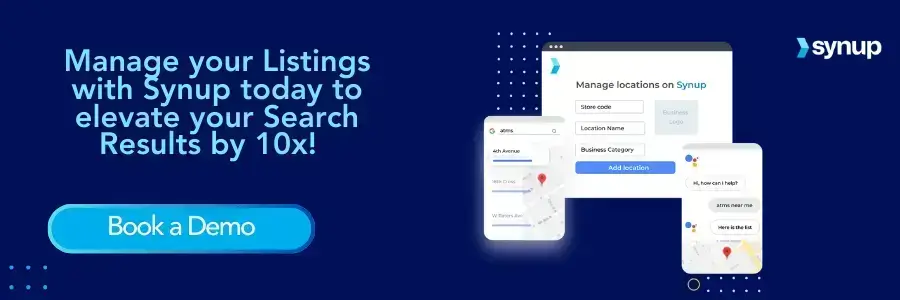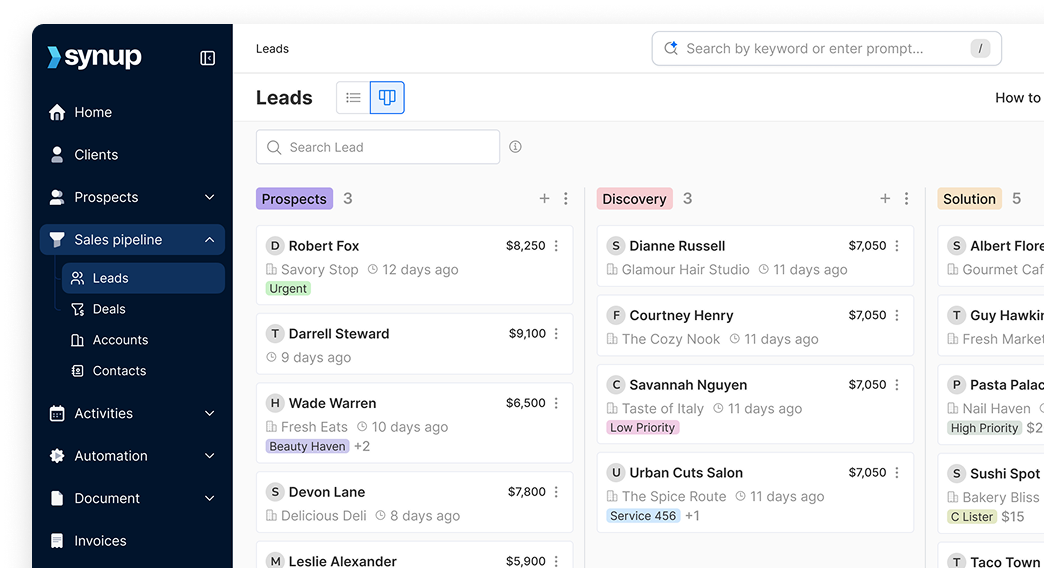How Local Listing Management Affects Search Rankings for Multi-Location Brands
Learn how effective local listing management boosts search rankings for multi-location brands while enhancing online visibility and customer engagement.

If you are a part of a business with multiple locations, you probably already know how local SEO can drastically boost visibility for each business location.
But did you know that poor local listing management can seriously hit your local SEO, search rankings, and sales? If you haven't prioritized this, it's akin to establishing an amazing store in a prime downtown location—but without any signage or indication of what you offer. People won't know you're there or what you sell.
Keeping your business details uploaded, updated, and consistent across online directories is key for local SEO. Nail that, and you'll improve local rankings, get more foot traffic, and build your reputation.
What Is Local Listing Management?

Local listing management is all about posting your key business information (name, address, phone number, etc.) online across all major local business directories and search engines, while regularly updating it with consistent information, photos, and videos.
For multi-location businesses, such as hospitality centers, hospitals, or casino venues, having a strong online presence is crucial. You can't afford to have five locations in the country but only one appearing in search results. This discrepancy clearly indicates that your local listings aren’t up to par —or worse, doesn’t exist at all.
Let’s be real: every day, people are searching for your type of business in your area. If they can’t find you, you're missing out on significant revenue. Proper listing management ensures all your locations are visible and ready to attract more customers.
What Are Localized Search Results?
Localized search results are what pop up when someone searches for a [type of] business "near me” or business in [city name].

Local SEO helps your business appear in those searches, which is crucial for multi-location businesses. For instance, when someone searches for "HVAC repair shop in Chicago," your business listing optimized for Chicago will show up if it is well-managed, even if you have shops in other cities. Local listing management ensures that each location appears in the appropriate search results.
The goal is to ensure customers find the closest location to them, not just any location. If your NAP information isn’t consistent, local SEO for multiple locations suffers, along with your chances of attracting those local customers.
The Role of Consistent NAP Data in Search Rankings
NAP (name, address, phone number) consistency is your business’s fingerprint online. If it's off, your local SEO will most definitely take a blow. Here are several reasons why listings can be inconsistent:
- Outdated Info: Your office moved two years ago, but your old address is still listed. Customers go there, but they find an empty space. Outdated information is like a broken GPS, steering customers in the wrong direction.

- Business Location Changes: You’ve opened a new spot, but it’s missing from the directories. People still think you're only at the original location. That means your new location is off the local digital map and will struggle to take off.
- NAP Errors: A single wrong digit in your phone number can lead to calls going to the wrong person. This could result in frustrated customers reaching out to you for clarification. Additionally, there’s a risk of potential legal issues related to data protection laws, which can negatively impact your business.
Action Tip: Regularly audit your listings. Double-check your name, address, and phone number across every platform. It may seem like a chore, but it’s how business listing management works to boost your local SEO and rankings for multi-location businesses.
How Listings Impact Local SEO
Local listings can directly impact your local rankings. Here’s how:
Managing Duplicate Listings
Duplicate listings can create confusion for customers and significantly disrupt your local SEO. Search engines may struggle to determine which listing is accurate, potentially harming your rankings. It’s essential to clean them up! Effective listing management is crucial, especially for multi-location businesses.
Role of Reviews and Ratings
Reviews aren’t just nice to hear; they’re gold for search optimization—particularly good reviews. Search engines love them. They boost your credibility and, ultimately, your rankings.
Bad reviews aren’t always detrimental either; it depends on how you handle them. Not responding to negative reviews confirms that the reviewer is absolutely right about your service being poor.
Potential customers read these reviews and may choose to go elsewhere. However, responding to bad reviews with empathy and a willingness to fix issues demonstrates that you genuinely care. This is a green flag for customers.
So, ask happy customers to spread the love, and be sure to respond to every review, especially the negative ones.
Role of Consistent Business Info
Consistency is key. If your business information doesn’t match across directories, search engines become confused. This inconsistency sends mixed signals to search engines, which is not beneficial. The algorithm will automatically lower your ranking in favor of more serious businesses with clearer and more consistent listings.
Local listing management, especially when automated (more on that soon), ensures your info is spot-on everywhere, boosting rankings for local searches.
Localized Content
Having location-specific pages in online directories or on your website can also impact your local ranking. This involves using local content marketing to present your business to potential patrons.
Make sure you tailor content for each location you have, such as “Best Pizza in Miami” versus “Best Pizza in Boston.” This approach helps search engines connect the dots and boosts visibility in local business directories.
Utilizing Local Listing Management Software for Multi-Location Brands
Managing listings for multi-location businesses can feel like trying to wrangle a dozen cats. Updating brand information, verifying new listings, handling reviews, and uploading new promotional photos and videos across all listings is a lot to manage.
Local listing management software, like Synup, can be a lifesaver. For local businesses looking to scale, a tool like this is essential. It builds your online reputation, maintains consistency in your information, and corrects duplicates while boosting your rankings. It’s like having a personal assistant who keeps your business information in check across all directories.

What Synup can help you with?
- Creates and Syncs Listings: From Google to Facebook to over 60 directories, Synup has you covered. It ensures your business listing information is consistent everywhere.
- Bulk Editing: Got multiple locations? No worries. You can edit all your listings at once with automated updates.
- Voice Search Optimization: Synup optimizes listings for voice assistants like Alexa and Siri, so customers can find you even when they’re talking to their gadgets.
- Reviews Management: You can be notified when reviews come in, and Synup can even generate automated responses based on location, ratings, and sentiment. That's efficiency!
- Advanced Analytics: Synup provides deep insights into how your listings are performing. It’s like having an SEO specialist on your team.
With Synup, managing multiple locations becomes a breeze. Whether you're updating NAP info or responding to reviews, the platform handles it all.

Summing Up
To sum it all up, managing your listings across multiple locations affects the search rankings for each business or location. However, with a good listing management software, it doesn’t have to be a nightmare. Synup makes it easy by handling everything from ensuring NAP consistency to boosting your local rankings, allowing you to focus on your core business activities.
Whether you manage five locations or fifty, Synup ensures your information stays accurate on Google, Facebook, and local directories. It's like having a personal assistant who never drops the ball.
If you’re serious about mastering local SEO for multiple locations, Synup helps your rankings soar!
How Local Listing Management Affects Search Rankings for Multi-Location Brands: FAQs
How do I target multiple cities with SEO?
Start by creating location-specific pages for each city. Include localized keywords and unique content. Managing consistent business information and using a solid local listing management platform also ensures your info is up-to-date everywhere.
How do I rank multiple locations in SEO?
You’ll need optimized listings and pages with localized content for each location. Make sure each page contains keywords, customer testimonials, and physical location content like photos and videos so locals can visualize how your business meets their needs.




